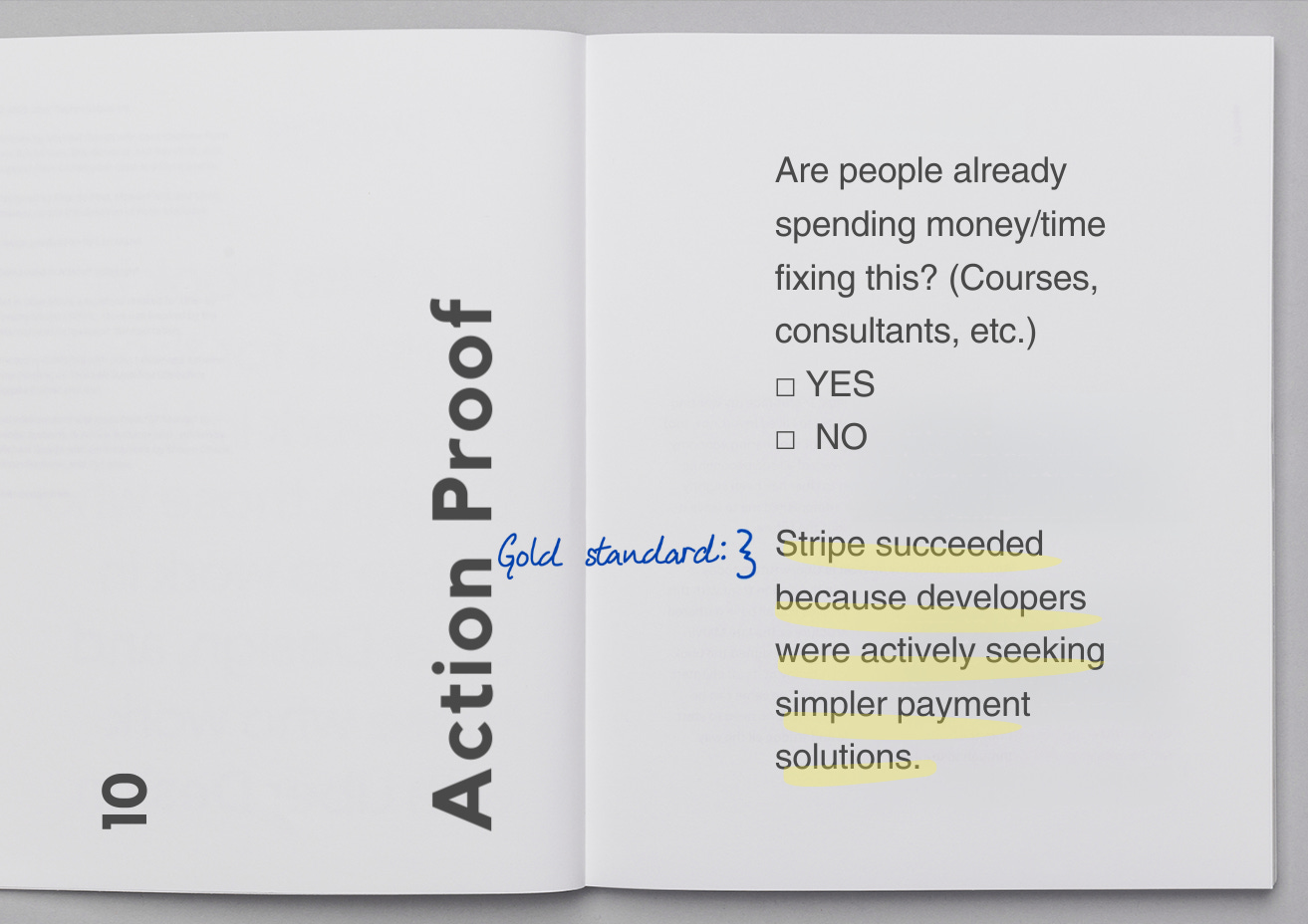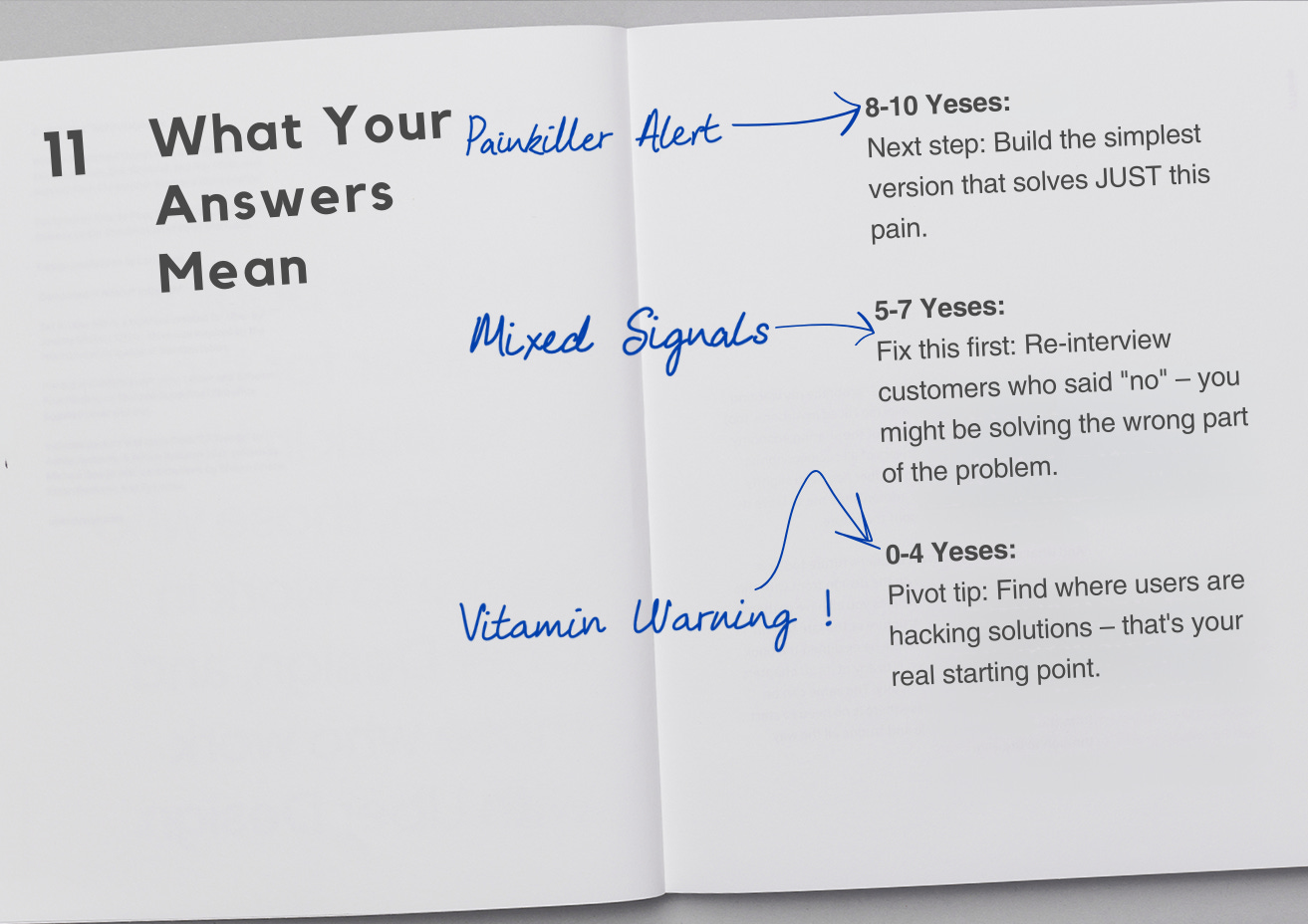I've talked with startup founders for over 10 years - from Venezuela to India. After thousands of calls, I've seen the same pattern.
Early-stage founders often fall in love with their ideas. They can't see their solution from the customer's view. Many never talk to potential customers. Some can't even describe who their first customers would be.
I created this simple test to help founders check if they're on the right track. These 10 questions can guide you to find a solution people actually need. They might even help you find product-market fit.
Try the test and see how your idea scores. If you want feedback, I offer 1-1 calls where you can pitch me directly.
What's a Painkiller vs. a Vitamin?
Painkillers fix urgent problems people want solved right now. Vitamins are nice to have but easy to forget or ignore.
Airbnb solved a real pain: "Hotels are too expensive during conferences." Slack fixed a daily headache: "Our team's communication is scattered across too many emails."
Let's see if your idea is a painkiller.
The 10-Question Pain Test
Answer each question honestly with a yes or no.
1. Instant Problem Recognition
When you describe the problem (not your solution), do people immediately say "Yes! That drives me crazy!"?
DoorDash founders saw restaurants turning away delivery orders. The pain was obvious.
2. Frequency Check
Does this problem happen often enough to be annoying?
Slack fixed daily communication problems. Airbnb solved less frequent but high-intensity accommodation headaches.
3. The Eye Roll Test
Do people roll their eyes, sigh, or look frustrated when talking about this problem?
Watch their reaction, not just their words. Physical signs of frustration mean real pain.
4. Existing Fixes
Are people already trying to solve this with makeshift solutions?
When people use spreadsheets, manual processes, or cobble together multiple tools, they're signaling a real need.
5. Wallet Check
Have at least 5 potential customers clearly said they would pay for your solution?
Be careful: "This looks interesting" is very different from "I'll pay for this tomorrow."
6. Now-or-Never Urgency
Do they need a solution now, not someday?
Slack teams started using it mid-project because email was failing them right then. Urgency means pain.
7. Fear of Loss
If your product disappeared, would 40% of users feel like they lost something important?
Figma users protested when Adobe tried to acquire them. That's the attachment you want.
8. 2X Better
Is your solution twice as fast, cheap, or simple as what exists today?
Stripe made payment processing dramatically easier with just 7 lines of code. Small improvements don't drive adoption.
9. Natural Referrals
Do users mention friends who need your solution without being prompted?
PayPal spread because eBay sellers naturally told other sellers about it. Unprompted referrals signal real value.
10. Action Proof
Are people already spending money or time trying to fix this problem?
If people hire consultants, buy courses, or invest in workarounds, the pain is real.
What Your Score Means
8-10 Yeses: Great! You've found a painkiller. Build the simplest version that solves this pain.
5-7 Yeses: Mixed signals. Talk again to customers who said "no" – you might be solving the wrong part of the problem.
0-4 Yeses: Warning sign. You're likely building a vitamin. Look for where users are creating DIY solutions – that's your real starting point.
Three Simple Rules
1. Test Before Building
Brian Chesky (Airbnb) talked to 100+ hosts before writing any code.
2. Look for Emotions
If people aren't visibly frustrated about the problem, it's probably not painful enough.
3. Beware Politeness
"Interesting idea" usually means "I'll never use this."
The Bottom Line
As Y Combinator says: "Your first 10 customers should love you so much they'd cry if you quit."
Build something that solves a real pain, and customers will find you.
What pain are you solving with your startup? How many questions can you answer "yes" to? Share in the comments below.
🔥 Upgrade to "The Founder Roast" (May Edition) 🔥
3 slots. No fluff. Just savage, honest feedback.
Note: Most of what I share is free because I enjoy it. But people value things more when they pay. You’ll get plenty for free—but if you want my time and feedback, I expect commitment.
















As a startup founder im enjoying every post Burak. Thanks for the effort
I really like the way you talk about ideas as either a "painkiller" or a "vitamin." If you didn't need the product yesterday, then maybe it's just a vitamin. I was in a foundry cohort of entrepreneurs at my university, and I was amazed at how many people just didn't want to talk to customers. They spent a lot of time stuck in the same problem because they were afraid of sharing what they made. This is so real, and I like having new language for these sorts of concepts.
Thanks for the read!!